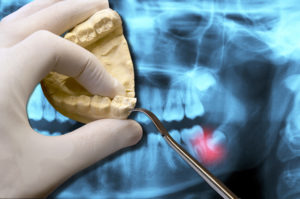Wisdom Tooth Removal
Having your wisdom teeth removed is an almost universal rite of teenage passage. Unlike most dentists, we don’t make you head over to an oral surgeon to remove your teenager’s wisdom teeth — our dentists handle that for you at Deeter Dental.
What Are Wisdom Teeth?
Wisdom teeth are classified as the third set of molars. They are also known as vestigial organs, leftovers of our prehistoric past that no longer have any function in our bodies today. Wisdom teeth join your appendix and tailbone in this group.
When we had three sets of molars instead of the current two, it made sense to have the extra chomping teeth. Our diets consisted of leaves, roots, nuts, and some very tough meat. All of this required far greater chewing power and caused greater wear and tear on our teeth. To make room for this extra set of molars, prehistoric jaws were longer than our current jaws.
Fast-forward to today, our diet is much softer and easier to chew, so our wisdom teeth are no longer needed. The problem is, they didn’t get the memo, and they still try and make their way down into our mouths. These are the ages when the three sets of molars generally come in: the first set erupts around age six, the second set at age 12, and the third set (wisdom teeth) somewhere between the ages of 17 and 25.
Reasons For Wisdom Tooth Removal
We can get away with our tailbone and appendix, but the arrival of our wisdom teeth is invariably bad news. If we still had longer jaws everything would be fine, but our modern shorter jaw length means there isn’t any room for a third set of molars. So, when your wisdom teeth come down they become impacted (blocked) by the other teeth. They can come in sideways, pushing on the adjacent teeth. They sometimes are surrounded by bone. Often one wisdom tooth will partially erupt, creating pockets in the gums that are perfect places for bacteria to thrive.
Although you may know someone who has their erupted wisdom teeth in place, people like that are very, very rare. For the rest of us, the wisdom teeth simply cause the other teeth to be pushed out of position and other dental issues, and they need to be extracted.
When Should I Have My Wisdom Teeth Extracted?
Extracting the wisdom teeth is better done sooner than later. They may wait to erupt until a person is in his or her mid-20s, but you shouldn’t wait until they erupt to remove them. Why? When a teenager is between the ages of 15 and 18 the wisdom tooth roots are only two-thirds formed. But if you wait, the roots fully develop, making extraction that much more difficult.
Wisdom teeth extraction is considered minor surgery. X-rays show us when the wisdom teeth are descending, which is another reason to be diligent with your twice-yearly professional cleanings and exams at Deeter Dental. At a certain point, they will begin to either erupt or start pushing on the other teeth. That’s the time to remove them. It would be easy if they had all erupted, but that is very rare. Instead, usually half the teeth are impacted. Often they’ll need to be broken to get them out to minimize the impact on the surrounding gum tissue and the jawbone.
Wisdom Teeth Removal Recovery
Your teenager will need about a week to get back to his or her old self after surgery. He or she will resemble a chipmunk for the first few days, depending on how many of the teeth were impacted (this creates more swelling). This swelling is normal. When you return home, there will be some bleeding. The patient will need to bite down firmly on a piece of gauze for about 45 minutes. Believe it or not, a moistened tea bag is also effective, as the tannic acid in the tea helps blood clots form. Repeat the process until the bleeding stops. If you have heavy bleeding, you need to call us.
Pain is usually manageable with over-the-counter options. Depending on how difficult it was to remove your wisdom teeth, we may prescribe pain medication. Either way, most pain will go away after a couple of days.
Avoid rinsing or spitting for 24 hours after your extraction. Don’t use a straw (sucking actions are bad), and avoid any hot liquids. These can break down and dislodge the clot. The swelling will happen but can be kept manageable with an ice pack. Apply it for 10 minutes, and then follow with 20 minutes off. This only has value for the first 24 hours.
As with any surgery, infection is the main potential complication, but if the patient rinses with saltwater and keeps his or her mouth relatively clean this risk can be minimized. You may have heard about “dry socket,” but its occurrence is also rare. This happens when the initial blood clot that forms when after-surgery bleeding has stopped becomes dislodged or dissolves. When this happens there is a direct line to the jawbone and the surrounding nerves. As you would expect, this is very painful, but treating it is not difficult.


